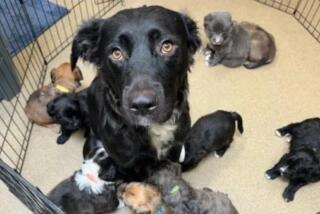Dogs rescued from South Korean meat farm remain shy and afraid
Of the 29 dogs brought to San Diego after being rescued from a meat farm in South Korea, 19 have been adopted but 10 need more training to overcome “shy and fearful behaviors” left from how they were treated in captivity, according to Humane Society officials.
The 29, arriving in mid-September, were among the 103 dogs brought to shelters in California and Washington under the Humane Society International’s campaign to end the Korean practice of slaughtering dogs for food.
The 10 are Jindo-mixes, a common breed found at dog farms that provide meat to restaurants in Seoul and other Korean cities.
“While these dogs have shown some behavorial improvement, they’re not yet entirely comfortable being handled or walking on a leash,” said Gary Weitzman, CEO of the San Diego Humane Society. “They’re still learning what it means to be a family member.”
Families ready to adopt one of the 10 will be offered free “shy dog” training classes and followup help from Humane Society trainers, Weitzman said.
“Every one of them is absolutely worth the effort,” Weitzman said.
Humane Society International paid the South Korean farmer to transition to other crops, according to Korean news coverage. The cages where the dogs -- mostly mastiffs, Jindo-mixes and Chihuahuas -- were once kept have been destroyed.
Dog meat has long been a delicacy in Korea. But a cultural shift has begun to discourage the practice.
In Seoul the number of restaurants that serve dog meat has dropped to about 700 from a peak of 1,500, according to the BBC. Some of the dog-meat farms have just 100 animals, “others have 10 times as many,” according to the BBC.
Humane Society International is campaigning to have the Korean government ban the dog-meat trade in advance of the 2018 Winter Olympics that will bring worldwide media coverage to Korea.
Anyone interested in adopting one of the 10 dogs in San Diego is asked to call 619 299-7012 to schedule an “inter-action.”
More to Read
Sign up for Essential California
The most important California stories and recommendations in your inbox every morning.
You may occasionally receive promotional content from the Los Angeles Times.










